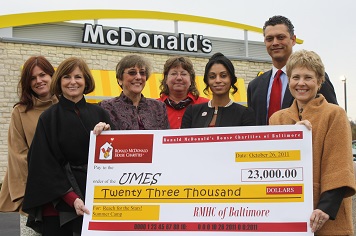Friday, November 4, 2011

PRINCESS ANNE, MD- (Nov. 3, 2011)-The sixth annual “Reach for the Stars!” summer camp for teens will be held in 2012 at the University of Maryland Eastern Shore, thanks to a generous grant from the Ronald McDonald House Charities of Baltimore.
Tina Baxter, an RMHC of Baltimore board member, and representatives of Salisbury-based Baxter Enterprises presented a $23,000 check to the university’s Institutional Advancement Office to sponsor next summer’s program. Baxter Enterprises is the franchisee for most McDonald’s restaurants on Delmarva.
“Reach for the Stars!” offers 40 teens from Worcester and Wicomico counties an opportunity to learn about robotics from engineers who work at NASA and UMES. Six college students enrolled in UMES’ Rehabilitation Services Program also participate to apply their skills with children with special needs.
Baxter visited the camp at UMES this past summer to investigate how it focuses on science education targeted specifically to middle schoolers.
“The Reach for the Stars program is so representative of the type of children’s organizations that our grants program supports, by directly serving the needs of children within a community,” Baxter said. “It is a program that addresses a much underserved area in the exploration of math and science while learning how to partner with students of different abilities.”
The summer program, which began in 2007, is a collaborative project of UMES, NASA (Wallops), Worcester County Economic Development and the Mid-Atlantic Institute for Space and Technology.
“This gift will make it possible for us to provide more students, particularly those students who are often overlooked, with an opportunity to get excited about science, technology, engineering and mathematics,” said Brenda Dingwall, equal opportunity specialist for NASA’s Wallops Flight Center.
The two-week camp encourages participants to pursue careers in those academic disciplines that educators commonly refer to collectively as STEM. The camp serves children with disabilities, at-risk students as well as those who are gifted and talented.
A Georgetown University economist recently produced a study that shows students who earn STEM degrees typically earn salaries that are 50 percent greater than those who major in the humanities.
When the camp launched in 2007, its goals were:
- To inspire and excite the next generation of scientists and engineers by providing students with real-world hands-on experience in science and engineering;
- To expose students to careers in STEM disciplines, particularly women, minorities and people with disabilities;
- To help students develop the skills necessary to succeed in the math, science and technology courses that will allow them to pursue STEM careers;
- To show students the clear path of opportunity for them to pursue careers in science and engineering;
- To provide future rehabilitation counselors with detailed knowledge of STEM careers, so that they may help people with disabilities develop the skills and make the contacts necessary to pursue these careers;
- To help current and future K-12 teachers develop a detailed understanding of what skills are

